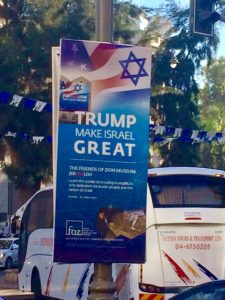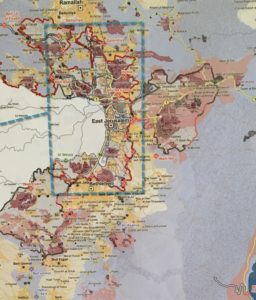
“Trump Make Israel Great”–This Trump-style slogan has made its way across the ocean to street signs paying homage to the new American president’s first visit to Jerusalem–albeit in slightly altered form from the U.S. version:”Make America Great Again”. Although Trump’s visit was in May, I still find the signs (paid for by a right-wing American-established evangelical organization) taped to lamp posts around the city; some signs now don ‘colorful’ graffiti altering the sign in more or less humorous or grotesque manners.
The hullabaloo surrounding whether the U.S. embassy would be moved to Jerusalem has subsided from general conversation since Trump signed a waiver in early June to delay any decision on moving it from Tel Aviv. However, there is still much speculation on whether the Trump administration is ‘pro-Israeli’ or not (and what that even means) and whether this administration has the potential to forge progress towards a two-state solution–despite Trump’s ambiguous comment back in February in a joint press briefing in Washington D.C. with Israeli Prime Minister Benjamin Netanyahu that he would be “looking at two-state and one-state and [he likes] the one that both parties like.”
I have made an effort here to gauge both Israeli and Palestinian attitudes towards the Trump administration in comparison with past American administrations. I had the opportunity to attend a lecture last week in which both the ‘mainstream’ Israeli and Palestinian narratives were presented, respectively, by an Israeli rabbi and settler who works for the Israel Political Advocacy lobbyist group (which, according to him, seeks to target the U.S. Congress and White House) and a top translator, from Arabic into Hebrew, for the Palestinian Authority President Mahmoud Abbas. (Of course, two speakers cannot encapsulate the Israeli and Palestinian ‘sides’ of the story; understanding what Israelis and Palestinians ‘think’ requires listening to as many perspectives as possible, and there are many more than two mainstream opinions varying by age, gender, socioeconomic status, religious and ethnic background, and rural or urban environment, etc.)
In the Q&A, both speakers were asked to reflect on the role of international actors, especially the United States, in potentially resolving the conflict. Both agreed that international efforts must be serious and impartial, but they disagreed over the impact of past American administrations.
The Palestinian debater argued that too much onus has been put on Palestinians to acquiesce to unfair concessions in an effort to “prove” that they are committed to the peace process. Whereas, he argued, there has been no serious pressure on Israel with the exception of the George H.W. Bush administration, pointing to Secretary of State James Baker who, according to the Palestinian speaker, did put “real pressure” on Israel during the Gulf War. The Palestinian debater was willing, and believes the Palestinian Authority, the main Palestinian governmental body of the West Bank, is willing to work with the Trump administration towards a two-state peace solution.
In comparison, a Palestinian Christian friend of mine from Jerusalem dissected the 2016 American election results in the following way: Hillary Clinton would have been “terrible” for the Palestinians because she was willing to agree to “anything” to get the support of the American Israeli lobby. On the other hand, Trump is also “greedy” and wants to accumulate personal wealth including “troubling dealings with Saudi Arabia”; however, according to my friend, Trump is less predictable than Clinton and thus could, potentially, bring refreshing change to re-jumpstart the peace process. In general, the Palestinians I have had contact with seem disillusioned with former President Obama–who “cared a lot but could not accomplish a lot”–and are now, to greater and lesser extents, hopeful that Trump can get the peace process going again.

Both the Israeli and Palestinian representatives in the debate were disappointed with the Obama administration for different reasons and interested to see what the Trump administration can bring to the mediating ‘table’ for different reasons. What is clear is that just as the American Trump slogan does not translate seamlessly onto posters here in the streets of Jerusalem, nor do American politics with our divisions between Democrats and Republicans translate easily onto Israeli and Palestinian interpretations of American presidents and their foreign policies in this region.